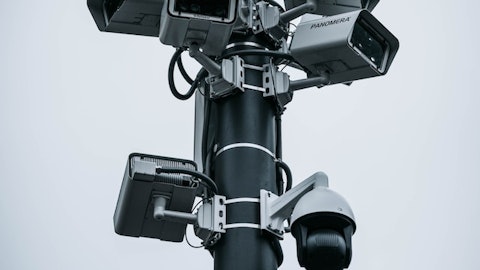Operator: And our next question comes from Chad Bennett of Craig-Hallum. Your line is open. Mr. Bennett, your line is open. Moving on, we have Raj Sharma from B. Riley. Your line is open.
Rajiv Sharma: Yes, thank you for taking my questions. I just wanted to understand the alarm sales. If you look at the composition in Q4 show a pretty substantial decline of about 33% year-on-year. How much of that impact do you think was from the Verizon sunset? And – and you – I think you commented that the dealers they started buying up, there was a lot of activity. Was that activity about 2, 3 quarters prior to the sunset date of Jan 2?
Kevin Buchel: Yes. And then it was prior. Yes. Well, I’ll answer this part first, then you could follow up. It was before they didn’t want to be caught short. So they weren’t going to start buying it January or even December. By then, they wanted to have it in stock. So this led up to the sunset, but like the June quarter, June of ‘22, was at its height. And even the September quarter of fiscal ‘23 to some degree, after that, it was over. The guys were they had to be in position to have equipment because the sunset was upon them. So we saw a lot of activity and again, it wasn’t just because of the sunset. It’s also because of delivery. We were one of the few manufacturers who could deliver radios during these crazy times.
And as I’ve said before, it was the crazy times was almost like a blessing in disguise because it allowed us to pick up some really big dealers, which we’ve talked about before. And these big dealers they couldn’t get delivery. They got to look at our product. They got to see what our radios were all about. The fire radios is the one I’m talking about, and they made the fire radios, their radio of choice. And that probably wouldn’t have happened if delivery was going on from the competitors, but they couldn’t deliver we could. They had guys who couldn’t get product, they were nervous. You had the 3G sunset. You have this radiomania going on. Which was at its high in June of 2022, continued in September of ‘22, which is Q1 of fiscal ‘23.
And then as the year progressed, it normalized our cost didn’t die, normalized, demand became more normal, and it’s still good demand. So just because we had this heightened situation, we shouldn’t feel like the bottom is dropping out. Business is still strong. The recurring stats are still good. We did have this situation.
Richard Soloway: It was a great thing for us to ship these radios when our competitors couldn’t do because once those radios go in, we picked up brand new market share quickly because from the competitors, and that recurring revenue stream continues on forever. So it was a blessing. Some of the distributors said we want to capture the volume of Napco radios, and they bought a lot of radios to have in their stock and they would never run out because they didn’t know when radios would be available from others. So they moved everybody into that place and they bought unusual amounts. That’s skewed it a little bit. But the radio business is strong, and it’s going to get stronger. And with our PRIMA product, and the fact that more copper has to be converted to radio, the future is very, very bright.
Rajiv Sharma: Got it. So I guess they will be tough comps, you expect tough comps to persist in the first half. Is that fair on the equipment side?
Kevin Buchel: I think the radio comp is tough for Q1. I don’t think it’s tough after that. Q1, I think, was the last of the hard comps for radios. By the same token, locking comp, not tough at all for Q1. So kind of like offsetting each other.
Rajiv Sharma: Right. Do you attribute any of this decline in alarm and intrusion to a commercial residential slowdown or was it entirely because of the Verizon sunset?
Richard Soloway: I think it was – I think that some of the distributors reacted to capture the market by having tons of inventory on their end, and satisfy the sunset, the dealers to satisfy the sunset. But as Kevin mentioned, this will work its way through, and we’ll keep adding new products which have recurring revenue, complete control panels, other radios for other applications. So that’s how we see the business.
Rajiv Sharma: Got it. Thank you. That’s it for me and I’ll take it offline. Thank you.
Richard Soloway: Thanks, Raj.
Operator: Thank you. And we have a question from Nick Mattiacci of Craig-Hallum. Your line is open.
Nicholas Mattiacci: Hi, this is Nick on for Chad Bennett. Thanks for taking our questions. So the door locking revenue is up 25% year-over-year, but not quite a sequentially strong as last year. Can you just talk about how that locking segment performed relative to your expectations and how we should think about growth in that segment for the September quarter?
Kevin Buchel: It performed really well – it was actually even better than I thought. It’s – this segment has done really well for 3, 4 quarters in a row. It actually – there’s 2 locking pieces to it. We have a Alarm Lock, and we have Marks – Alarm Lock did just as well as it did in Q3, and Marks did even better in Q4 than it did in Q3. So they both did well. I wouldn’t read anything into whether sequentially, it was a little up or a little down, was way more in each of the quarters in Q3 and Q4. And than it was in the preceding year’s period. And as I said earlier, the Q1 comp is fairly I’ll call it fairly easy. So I have very good expectations for the locking in this upcoming quarter as well. The locking business benefits from the school security segment, airport upgrades, hospitals lots of things, but those are the 3 that stand out.
The school security part is difficult to measure. I always get a how much is it? Tell me how much it is. They buy through distribution, so we don’t know. One of the things we mentioned in the release today was the school job at the University of Arizona did. They had a professor that was killed about nine months ago. They recently put in 700 of our Trilogy electronic locks I didn’t really know about it. They bought it through a distributor. The only reason I heard about it was because there was a big news article and a big thing on TV out there. So a lot of times, we don’t go through distribution. Sometimes we know, sometimes we don’t. But I know when locking is strong, that is a big part of it. And with all the craziness going on, I believe that’s here to stay.
That’s not going anywhere. So our expectations is for locking to stay strong for various reasons.
Richard Soloway: One thing I’d like to mention is. Kevin talked about the Trilogy lock, – the Trilogy locks are the standard of the entire locking industry. That’s the lock everybody is using. All the key larger jobs you’re using the commercial lock, it’s being put in everywhere. And more trouble around the U.S. with schools, with people entering office buildings and taking out things because of the fact that there’s a lot of people that are not working. They’re putting in Trilogy locks and all of our locks, especially the Trilogy locks everywhere. So it bodes well that Trilogy locks should be – will be selling continuously and we’ve now expanded the Trilogy lock line where they now work with radio control.
They work as stand-alone on the virtual doors. And it’s a very, very unique line of products. And that’s why the distributors are carrying it. And we don’t always hear that at the sale. We just see the amount of volume of larger distributors and it’s greater, much greater than we see than last.





